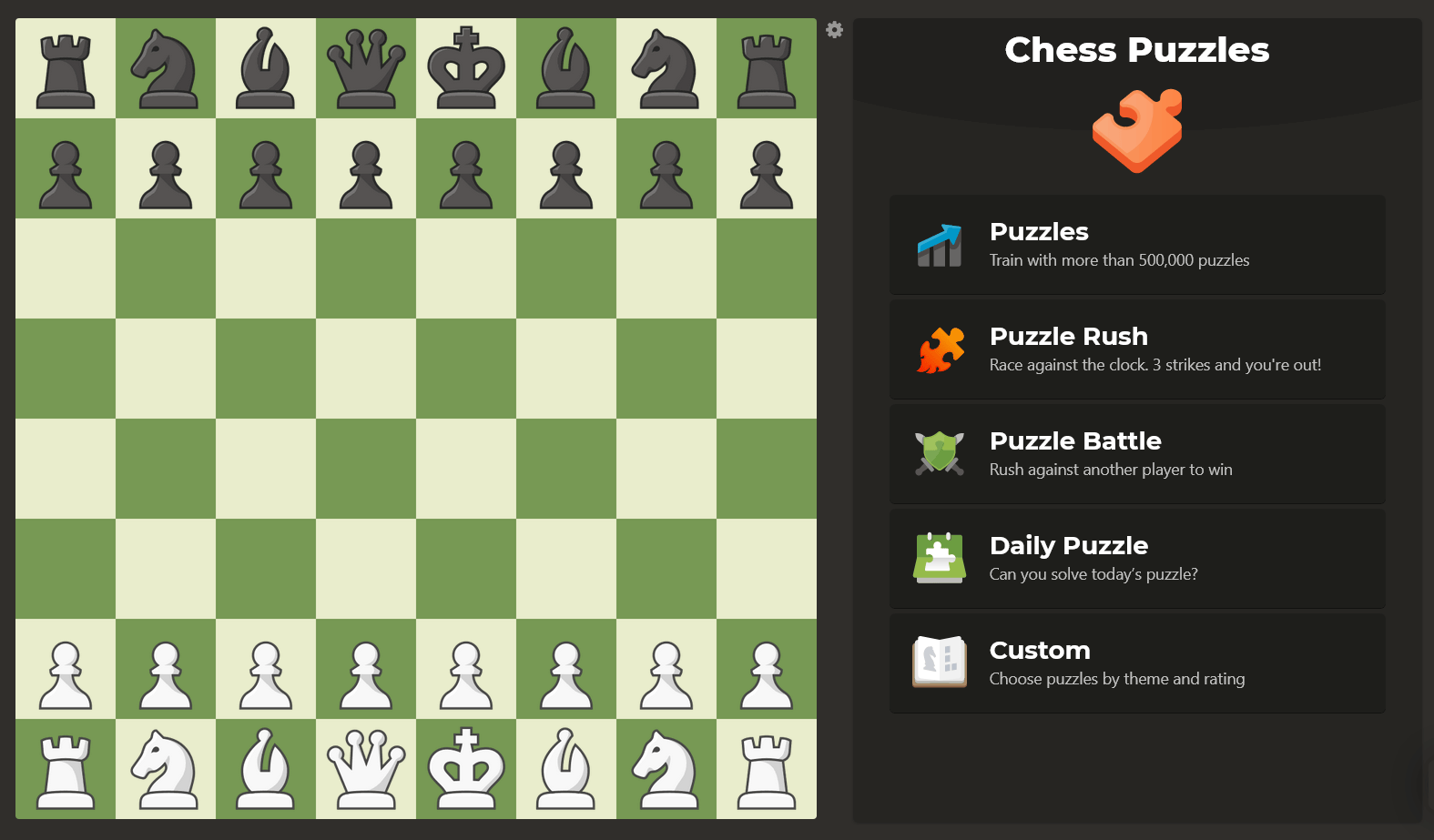
The 1-1-1 Study Plan
When you work on chess, what do you actually do?
The question sounds simple, but the more you think about it, the more questions it raises. Playing or studying? Videos or books? Blitz or rapid? Openings or endgames? With so many parts of chess to work on (and so many resources to do it), it can feel like you’re on a twelve-dimensional treadmill that always leads back to the same place: no improvement.
With that in mind, I started thinking about a different question: What’s the simplest chess improvement plan that could possibly work?
That question eventually led to the idea for today’s article. It’s my attempt at a minimum viable improvement plan. The idea is to come up with the simplest possible plan, requiring the least planning or overhead, that will still allow you to improve steadily at chess. The result is what I call the 1-1-1 plan: 1 puzzle per day, 1 serious game per week, and 1 new concept per month.
1 Puzzle/Day
Consistency is key. If you want to get better, the best way to do it is to work on chess every day. This keeps your brain humming along in the background and lets you build on what you’ve learned step by step. The reason I start with 1 puzzle/day is it’s the easiest way to start a daily chess habit, while also developing skills that are crucially important.
When I say “easiest,” I don’t mean the puzzles are easy to solve. They can be fiendishly difficult. What I mean is that, compared to other chess activities, doing puzzles is easy from a logistical perspective. All you have to do is go to the Chess.com puzzles page, close all your other windows, and get started. There’s no overhead like setting up a board, finding an opponent, or anything else to get in the way of starting your training. This makes it the easiest way to build up a daily chess habit.

The tactical skill you build up from puzzles is also extremely important for winning chess games. Lately, I’ve been watching the Women’s World Cup (well actually, I’ve been watching two world cups, the soccer one and the chess one, but for the moment I’m talking about soccer). To the untrained eye, much of soccer involves shuffling aimlessly around the middle of the field. But every once in a while, there is a golden opportunity: the ball flutters invitingly in front of the goal, and for just a moment, if someone acts with urgency and skill, they can put it in the back of the net. Clearly, what you do in these moments has a huge impact on who wins the game.
Tactics in chess are the same way. The opportunity for a winning shot doesn’t come along very often, but in a way that makes it all the more important, because that’s your chance to win the game. These are high-leverage moments, so you need to be ready to seize them.
Can you do more than 1 puzzle per day? Of course, but remember, consistency is key. More time invested will generally lead to faster improvement, but if you set a goal so high that you can’t keep up with it, or you lose focus by the end of the session, it becomes counterproductive. If you want to learn how to get more out of solving puzzles, check out my previous article.
1 Serious Game/Week
There is a tendency to believe that effective training has to be complicated: solving endgame studies, blindfolded, in an ice bath. Actually, that sounds pretty cool. But in many cases, the best training is simply doing the thing you want to get better at. For chess, that means playing chess games. But how you play the games really matters! Random bullet games while scrolling Twitter X is not going to get you very far. That’s why I specified “serious” games. But what does that mean, exactly?
Well, in a perfect world, it would mean over-the-board tournament games. There is something about being in the tournament hall that brings out a level of focus and intensity that most of us can’t access while sitting in front of our computer screens, no matter how much we’d like to. For that reason, over-the-board tournaments are worth their weight in gold. But for most of us, playing an over-the-board tournament every week isn’t in the cards. Believe me, I get it: I have a 1-year-old who just decided to STOP SLEEPING.

Fortunately, online chess can also be a great way to get meaningful games in, provided you do it right. So, here are my criteria for a serious game:
- No distractions. No other windows/tabs open, and your full attention is on the game. This means no Facebook, Instagram, emails, etc.
- Give 100% effort. This means you don’t resign if you get a bad position and you don’t chuck out random moves you know are bad. You play the absolute best game you’re capable of playing.
- Reasonably slow. Not bullet, and preferably not blitz. There’s no hard and fast limit here, but choose a time control where you feel like you have time to think. Time pressure should not be the dominant thing you experience during the game.
- Review the game. This is absolutely key! Reviewing the game has at least as much value as playing it!

It may be tempting to try to learn everything you can about chess before going into battle and putting your ego on the line, especially with over-the-board chess, but this ignores the fact that playing those intense games is the best way to improve. The sooner you take the plunge and start playing those games, the faster you’ll be able to improve.
1 Concept/Month
One of the enduring mysteries of chess improvement is how it’s possible to learn tons of new ideas without managing to increase your rating at all. The key to this mystery is the gap between knowledge and skill. There’s a big difference between knowing something and being able to implement it successfully under time pressure against an opponent who’s trying to thwart your every move. For this reason, whenever you learn a new idea, it’s essential to practice extensively until you get to the point where you can apply the idea successfully. Many players go wrong by learning too many new ideas without enough practice.
At the same time, it would be a mistake not to take advantage of the wealth of chess information that is available out there. You could just play all the time and never read a book or watch a video, but If you do that, you’re basically learning chess like a medieval peasant. My database doesn’t go back that far, but I feel confident in saying that most of those guys weren’t improving very fast. Part of that is down to malnutrition, but equally important is the lack of good learning resources. In chess, you have the ability to stand on the shoulders of giants, and you should absolutely take advantage of that. But you should do it with proper respect for how hard it is to incorporate a new idea into your game and how much practice it takes.

That’s where 1 concept/month kicks in. This cadence is designed to give you enough time to practice whatever it is that you’re learning. And while the category of a “concept” is admittedly broad, it’s meant to encompass any area where you’re acquiring new knowledge that will significantly change how you play. It could be anything from learning a new opening, to a new strategic concept like leveraging a space advantage, to mastering pawn endgames.
A good way to organize this is to focus on one learning resource at a time. Whether you’re working on a book or one of Chess.com’s online lessons, focus on one resource at a time. When it comes to choosing what to focus on, take cues from your game review: work on the things that are currently costing you the most points. And don’t spend too much time agonizing over the perfect thing to study next. Chess is a big game and over the course of your career, you’ll learn about many different parts of it. As long as you’re working on something relevant and interesting, you’re on the right track.

Conclusion
So that’s it, a way to radically simplify your chess improvement plan. It may seem paradoxical, but often chess improvement isn’t about doing more, it’s about doing less, but with more focus and consistency. Give the 1-1-1 plan a shot and let me know how it works!
Check out more content from FM Nate Solon here!


